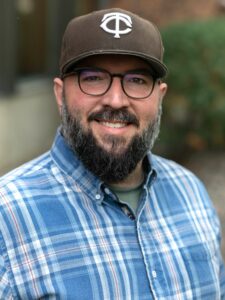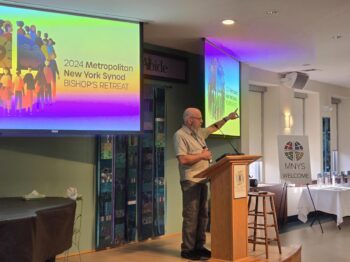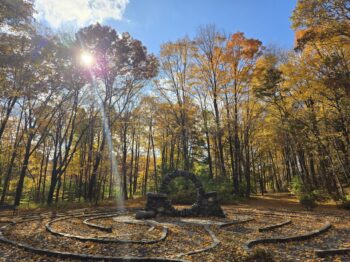 By Nick Tangen
By Nick Tangen
A couple of weeks ago, I was invited to share a bit about the work of Faith Practices & Neighboring Practices with the Metro New York Synod at their Bishop’s Conference. The first two days of the conference were for pastors and deacons in the synod, rostered ministers serving a variety of calls across the city. The last two days were for the “Synod’s Synodical Deacons.” A synod deacon is not a common role across our church, and prior to this conference I knew almost nothing about them, but after spending two days with these church leaders I was intrigued and excited by their unique contributions to the church.
Synod deacons are lay people who have been formed and called to serve particular ministries, most often in their home congregations. They are not ordained as rostered ministers, but are set apart to serve in their local congregation and parish community – teaching, organizing, serving, and forming other leaders. Synod deacons complete a two-year formation program (in the Metro New York Synod this program is called Growing in Faith) and go through a candidacy process similar to our rostered ministers.

Talking with these incredible leaders was a blessing, and I loved hearing stories of lay people discerning their unique vocational calls within their own congregations. Several of the synod deacons I spoke with did not grow up in the Lutheran church and felt a strong desire to better understand the church they were joining and jumped on the chance to participate in the Growing in Faith formation program. Others had a clear sense that God was calling them to be connectors and community builders in the neighborhoods around their church. All of them were clear that God had called them as faithful lay people to serve the church.
When I first began to discern my own vocational call, I was convinced that serving the church meant that I would need to become a pastor (I didn’t even know about deacons at that point), and I started seminary fully intending to follow that ordination track. It took only a few months to realize that, in fact, this was not God’s call for me.
“God had called them as faithful lay people to serve the church.”
Later when I learned more about rostered deacons in the ELCA, I thought that God might be calling me in that direction. But again, as I reflected and worked and continued to talk with friends, family, and fellow church members, I realized that this was also not the direction God was calling me toward. But everywhere I went it felt like leadership and ordination were somehow synonymous.
In a moment of consternation over direction and vocation, my friend and colleague, Bob Hulteen reminded me, “Ya know, the church needs engaged and committed lay people as much as it needs strong pastors and deacons.” It was a moment of clarity for me – God calls lay people to ministry in our church just as much as our other leaders, and God was calling me to ministry as a lay person. God calls people into various types of work, and each role is essential. I think we are in a moment where championing the call and responsibility of lay people across our church is especially needed.
PASTORS AND DEACONS take on so much in our congregations, often holding more than can be completed or shepherded by one person. Burnout, chronic stress, and isolation are real concerns for many rostered ministers. The landscape of professional ministry and church life is shifting as congregations realize that they may not be able to pay and support full-time clergy in the way they once could. And trust in religious institutions continues to take a hit across our country.
“The church needs engaged and committed lay people as much as it needs strong pastors and deacons.”
 For the health and sustainability of our churches and our leaders, we need (now more than ever) engaged lay folks to share the load and imagine a future different than the past. We need lay folks who are formed practically and theologically for ministry in their own contexts, contributing their unique gifts, strengths, and passions to a myriad of creative and generative ministries. And we need a recommitment to the fullness of the Body of Christ.
For the health and sustainability of our churches and our leaders, we need (now more than ever) engaged lay folks to share the load and imagine a future different than the past. We need lay folks who are formed practically and theologically for ministry in their own contexts, contributing their unique gifts, strengths, and passions to a myriad of creative and generative ministries. And we need a recommitment to the fullness of the Body of Christ.
How might our own synod invest in the intentional formation of lay people? Projects like Faith Practices & Neighboring Practices, and the soon-to-launch Family Faith, pay close attention to the formation and leadership of lay people. Our synod community organizing work does and will continue to develop lay leaders in our synod for the sake of social and political change.
But what else might we do together to form, affirm, and celebrate the leadership of lay people across the Minneapolis Area Synod? This question has re-emerged for me after meeting synod deacons in the Metro New York Synod, and I look forward to imagining possibilities together here in our own context.
